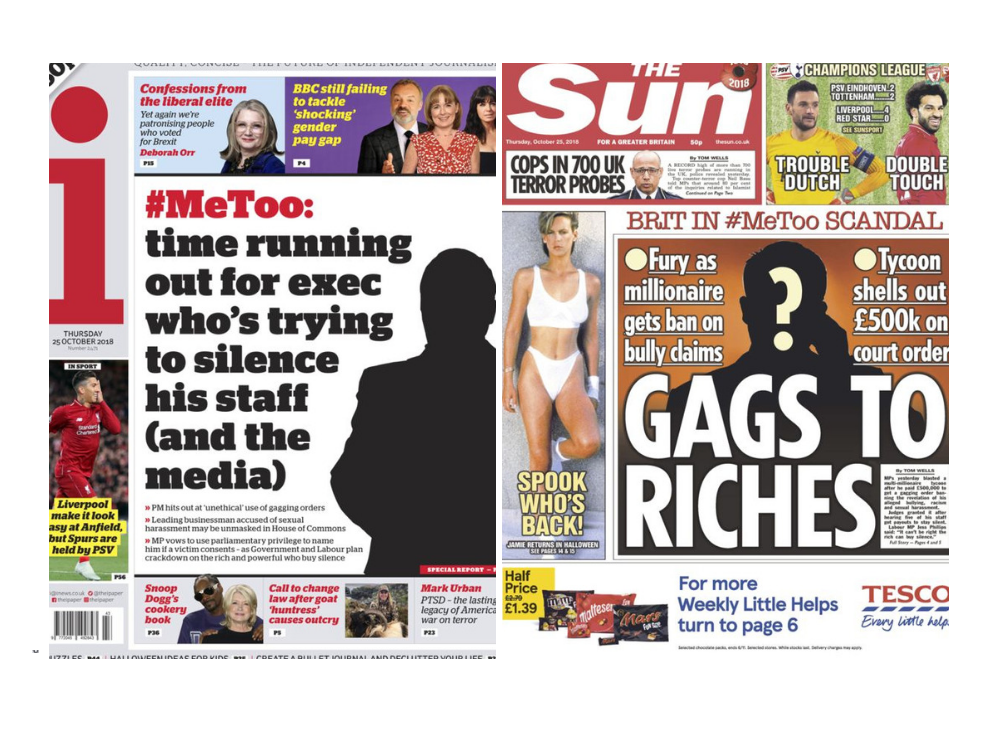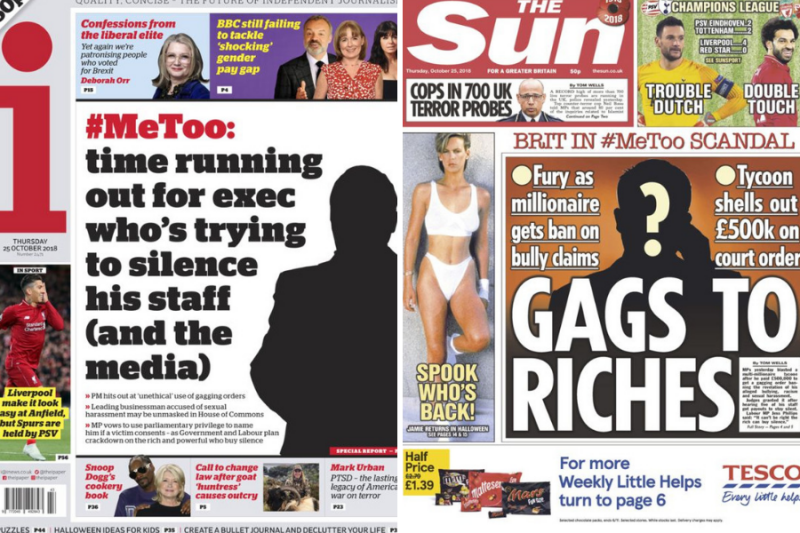
The Sun and i newspapers have come down on gagging laws in leader columns following the Telegraph’s “gagged” #MeToo scandal splash yesterday, as well as following up the story on their front pages.
The Telegraph reported yesterday about a “leading” British businessman who took out an injunction to stop the paper revealing claims of sexual harassment and racist abuse made against him by staff.
It splashed the story with the headline: “The British #MeToo scandal which cannot be revealed.”
Both the Sun and i newspapers criticised the Court of Appeal’s decision to grant an interim injunction against the Telegraph after it had first been rejected by a High Court judge. The case will be heard in full next year.

The Sun and The i front pages. Picture: The i/The Sun
The Telegraph revealed that it had spent eight months investigating the claims against the businessman, which it says “would be sure to reignite the #MeToo movement” once revealed.
According to the paper, the businessman has spent £500,000 on legal fees so far in blocking publication of the claims against him.
In its column today, The Sun said: “Is it in the public interest for a loaded businessman to be able to silence the press by spending half a million quid on legal proceedings?
“Or for the public to know what he’s been accused of, and paid handsome sums to keep it quiet?
“Over the past year, we’ve seen the High Court impose serious reporting restrictions on police arrests and a bid by Press-hating tycoon Max Mosley to wipe his fascist past out of history citing the ‘right to be forgotten’.
“It will be you, the public, who lose out if the rich and powerful stop us doing our job.”
Editor of the i, Oliver Duff, wrote in his column: “Would you like to work for the company where a leading executive has been accused of sexual harassment and racial abuse? Which has paid “substantial” settlements to no fewer than five staff as a result?
“No? Me neither. The problem is that you don’t know which company it is – and we can’t tell you.
“Welcome to the world of gagging orders, and to a wild legal decision which prevents not only the alleged victims from speaking out, but also the Daily Telegraph, who uncovered the story.”
The Telegraph claimed the businessman had used non-disclosure agreements, or NDAs, on at least five occasions to silence alleged victims with “substantial sums” of money.
In a leader column pushing for NDA reforms that would allow victims of harassment to speak out, The Telegraph said today: “Public opinion has shifted against NDAs: few now believe that people should be prevented from making allegations of serious, sometimes criminal behaviour public, under threat of breach of contract. The law has not caught up.”
The paper added: “There is a public interest in revealing the existence of NDAs when they point to a pattern of behaviour by someone in a position of power.
“Anyone who has faced harassment should have the right to say “Me Too” without facing financial ruin – and the public has a right to know when the powerful seek to silence the vulnerable.”
Speaking on the issue of NDAs in Parliament yesterday, the Prime Minister said: “Non-disclosure agreements cannot stop people from whistleblowing, but it is clear some employers are using them unethically.”
She said the Government would bring forward measures for consultation to seek to improve the regulation around NDAs and “make it absolutely explicit to employees when a non-disclosure agreement does not apply or cannot be enforced”.
In an email to staff sent on Tuesday night, Telegraph editor Chris Evans said he was “confident that, eventually, we will overturn the injunction”.
Picture: The i/The Sun
Email pged@pressgazette.co.uk to point out mistakes, provide story tips or send in a letter for publication on our "Letters Page" blog
